2020 Lincoln Corsair Review: Quiet Luxury in a Smaller Size
Designed from scratch to be a Lincoln, can the 2020 Corsair serve a diverse audience?
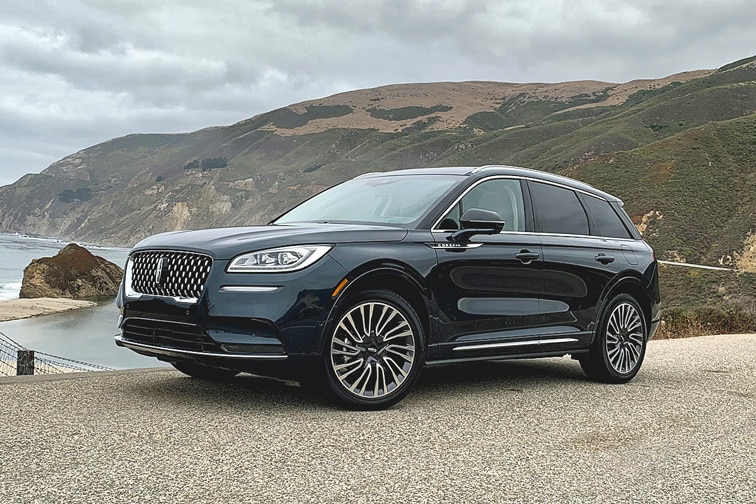 Christian Wardlaw
Christian Wardlaw
Lincoln is no stranger to the growing small luxury SUV segment. Back in 2015, it reworked the Ford Escape, transforming it into the Lincoln MKC. Half a decade later, timed in conjunction with the redesigned Escape, the 2020 Lincoln Corsair replaces the MKC with what looks like a scaled-down version of the company’s own 7-passenger Aviator.
Using a recipe similar to the MKC, the new 2020 Corsair improves upon it with greater style, more power, added technology, and extra refinement. A real name helps to make it memorable, too.
As the least expensive Lincoln, Corsair has an important mission: It must bring new buyers into dealership showrooms, appealing equally to Millennials with money to splurge and to empty nesters alike.
Beyond that, the Corsair must be different from every other small luxury SUV while delivering the design, driving dynamics, and technological sophistication offered by the competition.
To test how well it achieves these objectives, Lincoln loaned us the Corsair Reserve—loaded with every option and a price tag of more than $60,000—for a challenging, but spectacularly scenic drive on California Route 1 through Big Sur.
Over the course of several hundred miles this Lincoln proved itself competitive. But as is true of every vehicle in this segment, it makes more sense at a lower price point and with less equipment than our test vehicle.
Maybe that’s why the new Corsair isn’t available in ritzy Black Label trim, like the old MKC was. Lesson learned, Lincoln?
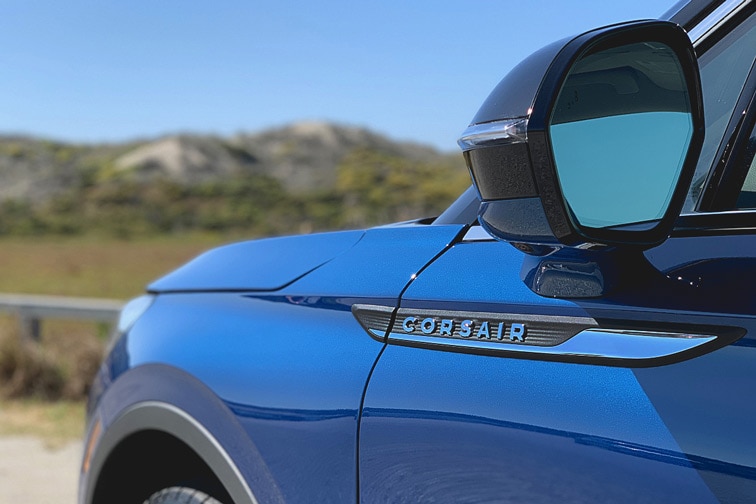 Christian Wardlaw
Christian Wardlaw
How Lincoln dares to be different
Once emblematic of the American auto industry's malaise—when several iconic carmakers became over-reliant on brand loyalty, resulting in middling quality and uninspired design—Lincoln is picking itself up, dusting itself off, and reclaiming its place as a legitimate luxury marque.
To reach the half of car buyers willing to try a new brand, Lincoln positions itself as ‘Quiet Luxury.’ This ethos is rooted in the idea that Lincoln customers seek a vehicle that serves as a rolling sanctuary with a calming environment, a coddling isolation chamber from the outside world.
Lincoln also seeks to make owners’ lives easier through exclusive perks like valet pickup and delivery service for scheduled maintenance, and through technology such as Phone as a Key that allows for vehicle operation using a smartphone app instead of a remote key fob.
Even if Lincoln successfully delivers on these brand promises, the products must be worthy of consideration. They need to exude quality, put a satisfied smile on a driver’s face, and inspire pride of ownership.
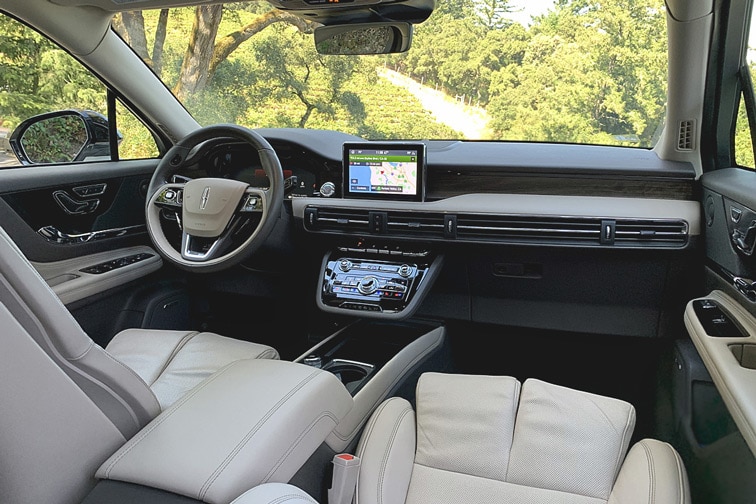 Christian Wardlaw
Christian Wardlaw
Inside, it's a stylized, retro Escape
Taking its cues from the larger Lincoln Aviator and Navigator SUVs, the Corsair’s cabin emphasizes width, making this small SUV feel larger than it is.
Bold design elements, use of chrome and gloss black trim, and a healthy helping of conventional controls give the Corsair a subtle retro appearance, its piano-key transmission buttons the only oddity of note.
Materials, especially in the loaded-up Reserve test vehicle, miss the mark in a few areas. Though coated in a low-gloss finish, and while it sounds solid rather than hollow when you rap your knuckles on it, the hard plastic covering the lower half of the cabin draws obvious contrast to other interior elements.
Additionally, the unpadded edge of the stereo and climate control panel dug into my right knee where my leg rested against it during hundreds of miles of driving. And the seam where the fabric-wrapped windshield pillars meet the headliner isn’t executed gracefully.
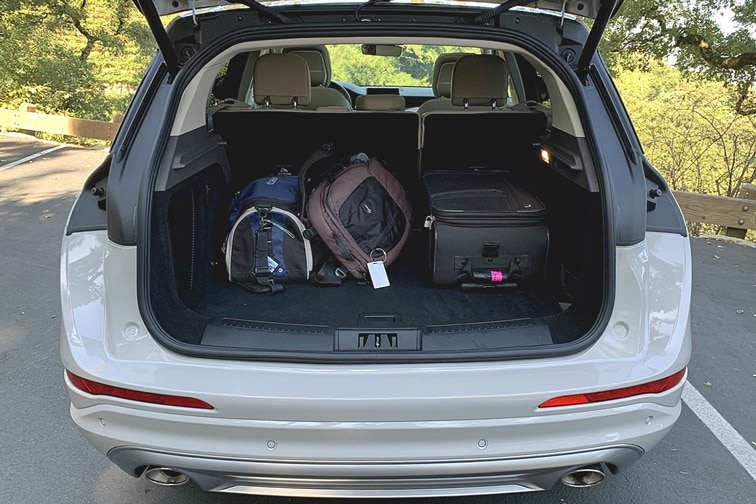 Christian Wardlaw
Christian Wardlaw
It can fit four adults and four sets of clubs
Equipped with heated, ventilated, and massaging 24-way Perfect Position front seats, comfort is built-in. But you don’t settle into the chairs with a relaxing “ahhhh” like you do in, say, a Volvo XC60. They creak a lot, too, and both the extending thigh supports and lower cushion side bolsters feel somewhat flimsy.
Adults can easily ride in the Corsair’s back seat, which slides forward and back on tracks, and heated rear cushions are available. Air conditioning vents, USB ports, and an available household-style power outlet help to satisfy passengers.
Cargo space measures 27.6 cu.-ft. behind the rear seat and 57.6 cu.-ft. with the rear seat folded down. Those figures are not generous, but in an apparent nod to its empty nester demographic, Lincoln says four full-size sets of golf clubs will fit in the trunk.
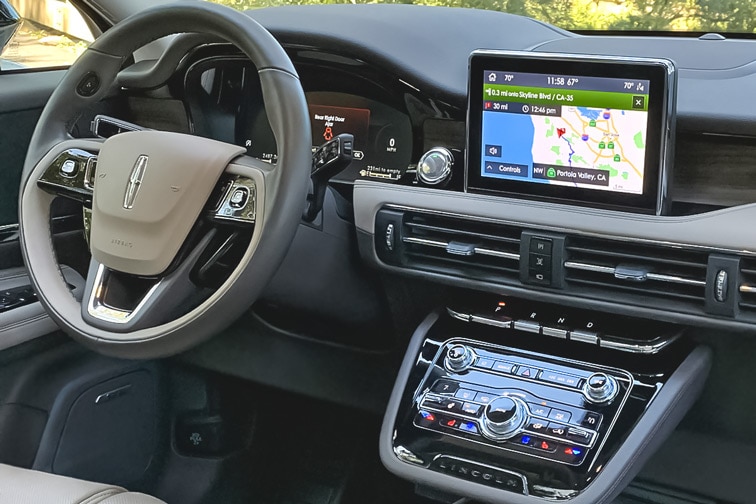 Christian Wardlaw
Christian Wardlaw
Tech that’s both ahead of the curve and behind it
The maximum infotainment screen size is eight inches, no better than average for a modern vehicle. You can, however, get an available 12.3-inch digital instrumentation display with a Calm Mode that shows nothing but vehicle speed.
Standard equipment includes Apple CarPlay, Android Auto, Lincoln Connect with a 4G Wi-Fi hotspot, and 911 Assist emergency calling through a paired smartphone. Navigation, a 14-speaker Revel premium surround sound system, and a comprehensive widescreen head-up display that remains visible when you’re wearing polarized sunglasses are available.
Lincoln’s Sync 3 infotainment system, once a leader in terms of responsiveness, graphics, and voice control, is rapidly falling behind. Without natural voice recognition and improved performance, this could be an issue for modern luxury buyers.
Phone as a Key, however, is on the cutting edge. As the industry slowly begins to move en masse to smartphone-activated vehicle operation, Lincoln will count as among the first automakers to adopt the technology. The Corsair’s Active Park Assist Plus system also impresses, taking complete control of the SUV to successfully park it in both parallel and perpendicular parking spaces.
Sophisticated Safety Systems
Safety is a Corsair strong point. Every version of the SUV includes Lincoln Co-Pilot360, a package of advanced driving assistance systems (ADAS) that provides key features such as forward collision warning with pedestrian detection, automatic emergency braking, and blind-spot monitoring with rear cross-traffic alert.
As an upgrade option, Co-Pilot360 Plus installs adaptive cruise control with stop-and-go capability, traffic-jam assist, lane-centering assist, evasive steering assist, reverse automatic braking, speed-limit sign recognition, front parking sensors, a 360-degree surround view camera and Active Park Assist Plus.
On the road, Co-Pilot360 Plus is a model of refinement, demonstrating just how sophisticated modern driver assist technologies can be. If there is room for improvement, it resides with both the speed-limit sign recognition system and the lane keeping and centering system.
During a trip from San Francisco to Los Angeles, the speed-limit sign recognition system twice misread 65 mph limits as 85 mph, immediately accelerating the SUV to match the perceived posted limit. The lane discipline systems demonstrated a difficult time responding to situations where exit- and on-ramps require a break in the lane marking paint, as well as when roads expand or contract by a lane.
As always, drivers must remain vigilant when driver assistance technologies are active.
Plenty of Power
As was true of the Lincoln MKC, Corsair buyers choose between a turbocharged 2.0-liter 4-cylinder and a turbocharged 2.3-liter 4-cylinder engine. Both are more powerful than before, with the former making 250 horsepower and 280 lb.-ft. of torque, and the latter generating 295 hp and 310 lb.-ft. of torque.
An 8-speed automatic transmission with paddle shifters powers the Corsair’s front wheels. All-wheel drive is an option with the 2.0-liter engine and standard with the 2.3-liter engine. It features a driveline disconnect system that helps to improve fuel economy by reducing drivetrain friction.
Drivers can choose between five different driving modes. They include Normal, Conserve, Excite, Slippery, and Deep Conditions, the latter good for heavy snow, mud, and sand. There isn’t an off-road driving mode because the Corsair isn’t engineered to tackle trails.
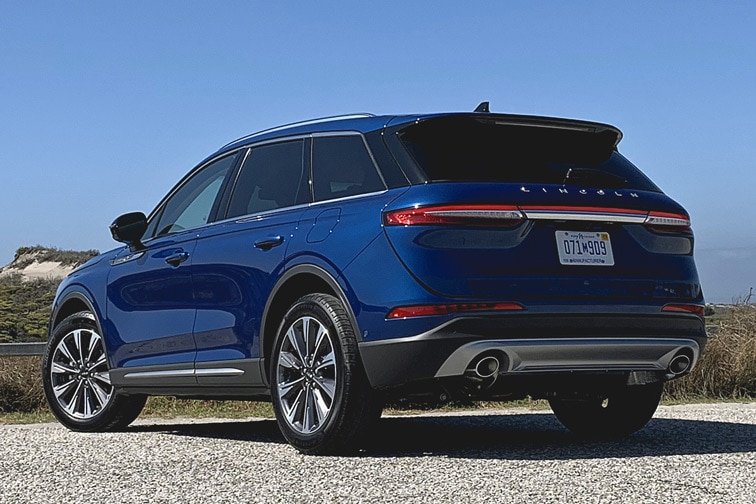 Christian Wardlaw
Christian Wardlaw
Genuine Hustle
During a short drive of a Corsair with the standard 2.0-liter engine, it was clear that it will satisfy most people most of the time. With plenty of torque, which is largely responsible for the sensation of acceleration, it has enough thrust for speedy getaways from intersections and easy merges onto highways.
The optional 2.3-liter delivers an extra 45 hp and 30 lb.-ft., and with it the Corsair is downright quick. Aside from some occasionally uneven response and one situation where a delayed downshift extended the time required to execute a passing maneuver on a two-lane road, the 2.3-liter provided good performance.
When equipped with the Corsair’s optional adaptive damping suspension, ride and handling qualities depend on the chosen Lincoln Drive Mode. Default is Normal, and in this mode the SUV has a compliant, relaxed ride quality that absorbs surface irregularities without introducing excess body movement. The Corsair also soaks up speed humps like they don’t exist.
Choose Excite mode, and the Corsair’s suspension snaps to attention. Unlike in the old MKC, however, the result isn’t frenetic and brittle. Throttle response improves, the steering adds weight, and the suspension is stiffer, but the end result is an SUV that feels naturally athletic rather than artificially inflexible.
It is worth noting that the Corsair is not an engaging performance SUV. (Remember: ‘Quiet Luxury.’) It can, however, hustle when you need or want it to, and it does so with genuine talent.
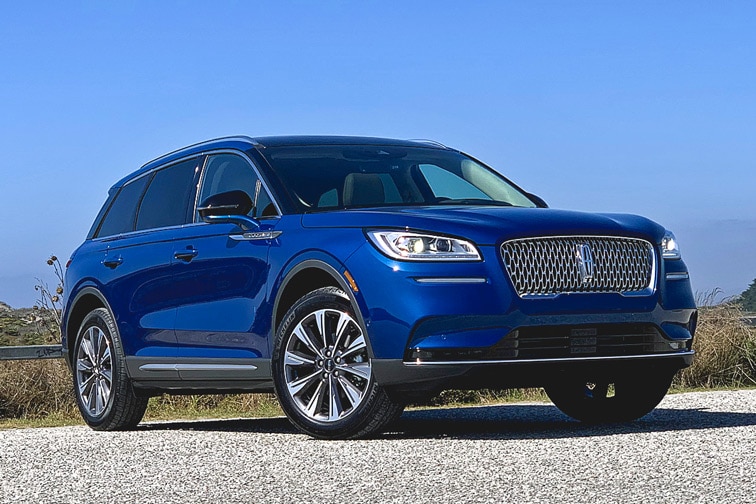 Christian Wardlaw
Christian Wardlaw
The Verdict: Broadly Appealing
While the Corsair comes in just two trim levels, Lincoln allows for a wide range of customization through paint colors, wheel designs, engine choices, and option packages.
As a result, you can spend as much money as you’d like, or you can equip this SUV with key features while keeping the price within reason. This flexibility helps Lincoln to serve younger buyers who are stretching to reach into the luxury segment while also serving older buyers who still want the best of everything, just in a smaller package.
At the same time, the Lincoln Corsair looks and feels different from most compact luxury crossover SUVs. Distinctive design helps, as does Lincoln’s ownership benefits program. The Corsair drives differently, too, thanks in large part to distinct differences between its Normal, Conserve, and Excite driving modes.
As with any vehicle, the Corsair isn’t without flaws. Nevertheless, this SUV not only supports Lincoln’s brand position, but is also genuinely appealing enough to attract new buyers, young and old.
VEHICLE STATS:
2020 Lincoln Corsair
Trim: Reserve
MSRP*
Base: $43,625 (including $995 destination charge)
As Tested: $60,110 (including $995 destination charge)
Selected Specifications:
Fuel Economy (city/hwy/combined): 21/28/24 mpg (2.3L AWD)
Power: 290 hp
Torque: 310 lb.-ft.
Seating Capacity: 5
Advanced Safety Systems:
Co-Pilot360: forward collision warning with pedestrian detection, forward automatic braking, blind-spot monitoring, rear cross-traffic alert, lane departure warning, lane keeping assist, automatic high-beam headlights, reversing camera, and a driver monitoring system
Co-Pilot360 Plus: adds adaptive cruise control with stop-and-go capability and traffic jam assist, lane centering assist, speed sign recognition, evasive steering assist, reverse automatic braking, front parking sensors, 360-degree surround view camera, and Active Park Assist Plus
Other Key Trims*:
| FWD | AWD | |
| Standard | $35,945 | $38,145 |
| Reserve | $42,630 | $44,830 |
*MSRP does not include $995 destination charge.
Written by humans.
Edited by humans.
 Christian Wardlaw
Christian WardlawChris says his first word was "car." For as long as he can remember, he's been obsessed with them. The design. The engineering. The performance. And the purpose. He is a car enthusiast who loves to drive, but is most passionate about the cars, trucks, and SUVs that people actually buy. He began his career as the editor-in-chief of Edmunds.com in the 1990s, and for more than 30 years has created automotive content for CarGurus, J.D. Power, Kelley Blue Book, the New York Daily News, and others. Chris owns Speedy Daddy Media, has been contributing to Capital One Auto Navigator since 2019, and lives in California with his wife, kids, dog, and 2004 Mazdaspeed Miata.
Related articles
View more related articles